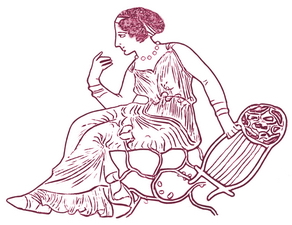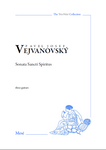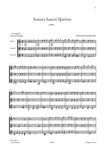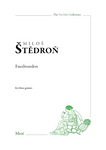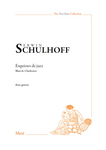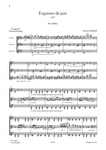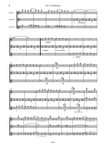Mesé
Mesé est l´édition du Trio Nété fondée en 2010. Par cette voie, les membres de l´ensemble voudraient enrichir l´offre de la littérature pour trois guitares non seulement en République Tchèque. Il s´agira de leurs propres arrangements et aussi des pièces originales pour trois guitares composées par des compositeurs tchèques remarquables. Ces compositions étant dédiées au Trio Nété, les auteurs furent aimables à donner leur consentement à la publication.
Bien que l´accent soit mis sur la musique tchèque, ce sont les Trois canzonettes d´un compositeur anglais Thomas Morley qui présentent le premier titre de l´édition. Ces „petites chansons courtes“ de 1593 furent destinées au divertissement d´un public large aussi bien que des musiciens amateurs, c´est pourquoi elles gagnèrent une grande faveur. La transcription des chansons est convenable même aux guitaristes moins avancés. Partition + parties séparées.
Thomas Morley
Three Canzonets
or Little Short Songs to Three Voyces
Mesé 001
Déjà en vente auprès de:
Haus der Musik Trekel - Hamburg
GuitarWeb
- midi sample -
. . .
Pavel Josef Vejvanovský
Sonata Sancti Spiritus
Mesé 002
The short piece from the beginnings of Vejvanovský´s compositional activities was composed for two violins, two viols (da gamba) and basso continuo but its fanfare-like character seems to prove the fact that the author was also an excellent court bugler in Kroměříž during the second half of the 17th century. The arrangement is equally suitable for guitar with two melodic instruments.
Level of difficulty: intermediate. Score + parts.
Now available:
Haus der Musik Trekel - Hamburg
- midi sample -
. . .
Claude Debussy
Le petit nègre
Mesé 003
The first wave of American popular music in Europe at the beginning of the 20th century inspired Claude Debussy who dedicated his Little Negro to young pianists. The piece is a cakewalk, a high-stepping dance of the slaves in the American plantation south which gave the birth to ragtime
and later on to jazz.
Level of difficulty: intermediate. Score + parts.
Now available:
Haus der Musik Trekel - Hamburg
- midi sample -
. . .
Miloš Štědroň
Fauxbourdon
Mesé 004
Miloš Štědroň enjoys working with the music of old styles which he systematically connects with the contemporary musical art using the methods of collage or montage. Fauxbourdon for three guitars, a reflection on the compositional technique from the beginning of the 15th century, is a good example of such work. The piece was inspired by a detailed study of an, "uncomposable" fauxbourdon by Matteo da Perugia,
a foremost composer of that time.
Level of difficulty: difficult. Score + parts.
Now available:
Haus der Musik Trekel - Hamburg
- midi sample -
. . .
Erwin Schulhoff
Esquisses de Jazz
Mesé 005
No. 4 Blues
No. 5 Charleston
Erwin Schulhoff became a great promoter of jazz in the between-the-war Czechoslovakia and dedicated many pieces to it or, at least, he used it in some parts of the pieces. Himself a virtuoso pianist, Schulhoff was also a regular performer in the jazz orchestra of Jaroslav Ježek in the Liberated Theatre in Prague for several years.
Esquisses de jazz (Jazz Sketches) is the cycle of six short pieces which, in a witty manner, open the way to jazz music for piano beginners.
Level of difficulty: difficult. Score - parts.
Now available:
Haus der Musik Trekel - Hamburg
midi sample
Blues - Charleston
. . .
”Why is it that after tuning the other strings one shifts mesé and then plays the instrument, the sound is painful and seems ill-adjusted not only when one plays the note belonging to mesé, but also in the rest of melody, while if one shifts lichanos or any other note, the difference is apparent only when one plays that note? Or is it only to be expected? All good tunes make frequent use of mesé: all good composers have continual recourse to this note, and soon revert to it when they leave it, but do not revert in the same way to any other note. Just as, if certain conjunctive words such as te and kai [both mean ”and”] are removed, what is said is no longer Greek, while the removal of other words causes no offence (since some words must be used frequently if anything is to be said, but others need not), so mesé is, as it were, a conjunction between the notes, especially in good music, because its sound is involved most frequently.”
Pseudo-Aristotle, Problems XIX 20
